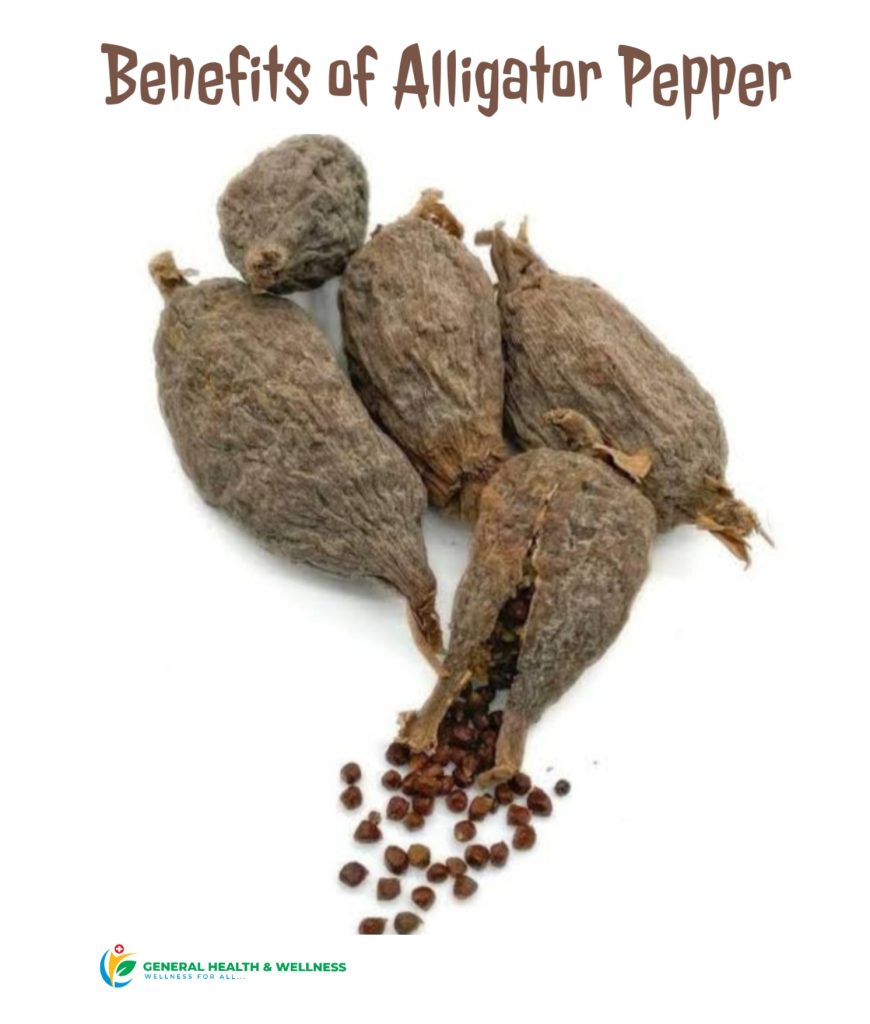What is Alligator Pepper?
Alligator pepper, scientifically known as Aframomum melegueta, is a spice native to West and Central Africa. It is a member of the ginger family, Zingiberaceae, and is commonly used in culinary dishes, traditional medicine, and rituals in various cultures. The pepper derives its name from its resemblance to the rough texture of an alligator’s skin. The seeds of the alligator pepper plant are typically small, round, and covered with a tough outer skin that can be removed to reveal a fiery, pungent inner seed.
Nutritional Information of Alligator Pepper
Alligator pepper, like many spices, is rich in bioactive compounds that contribute to its medicinal properties. While exact data on the full nutritional profile may vary slightly depending on its source, the seeds generally contain the following key nutrients:
- Calories: 100g of alligator pepper seeds provide approximately 300–350 calories.
- Proteins: It contains around 6–8 grams of protein per 100g.
- Carbohydrates: About 60–70 grams per 100g.
- Fats: Alligator pepper seeds have around 10–15 grams of fat per 100g, with a combination of saturated and unsaturated fats.
- Fiber: The pepper seeds provide about 5–7 grams of dietary fiber per 100g, aiding digestion and promoting gut health.
- Minerals: Alligator pepper contains essential minerals such as potassium, magnesium, calcium, and phosphorus, which support various bodily functions like muscle and nerve function, and bone health.
- Vitamins: It is also a source of vitamins like Vitamin C, B-vitamins (including B1, B2, B3, and B6), which contribute to immune support, metabolism, and overall well-being.
- Phytochemicals: The pepper seeds are known to contain bioactive compounds such as alkaloids, flavonoids, and essential oils, which are responsible for its potent medicinal properties.
Health Benefits of Alligator Pepper
Alligator pepper has been traditionally used in African medicine for its wide-ranging health benefits.
Here are some of the key benefits:
1. Digestive Health
Alligator pepper is known to have carminative properties, which can aid in digestion and help relieve bloating, indigestion, and gas. It stimulates the digestive enzymes and can act as a mild laxative, promoting regular bowel movements.
2. Anti-inflammatory and Antioxidant Properties
Alligator pepper contains antioxidants, which help neutralize harmful free radicals in the body. This reduces oxidative stress and inflammation, which are linked to various chronic diseases, including heart disease, arthritis, and cancer.
3. Pain Relief and Analgesic Effects
The bioactive compounds in alligator pepper, such as capsaicin, have pain-relieving and analgesic effects. It is used in traditional medicine to relieve headaches, joint pain, and muscle aches. It can be consumed as a remedy or applied topically in some cultures.
4. Weight Loss Aid
Some studies suggest that alligator pepper may have thermogenic properties, meaning it could increase metabolism and promote fat burning. It is often included in weight loss regimens to enhance fat breakdown and reduce appetite.
5. Blood Circulation and Cardiovascular Health
Regular consumption of alligator pepper may help improve blood circulation and prevent conditions like high blood pressure, stroke, and heart attacks. The spice contains compounds that may help relax blood vessels and improve blood flow.
6. Antimicrobial and Antifungal Effects
The seeds of alligator pepper have been shown to have antimicrobial properties, making them effective in combating harmful bacteria and fungi. This is particularly useful in preventing infections and treating wounds or skin conditions.
7. Sexual Health and Libido Booster
In some African traditions, alligator pepper is believed to enhance sexual health and improve libido. Some studies suggest it can stimulate the reproductive system, increase sperm motility in men, and improve sexual function.
8. Blood Sugar Regulation
There is emerging evidence that alligator pepper may help in regulating blood sugar levels, which could be beneficial for individuals with type 2 diabetes. It may improve insulin sensitivity and reduce blood sugar spikes after meals.
9. Detoxification and Liver Health
Due to its antioxidant properties, alligator pepper may support liver detoxification by promoting the elimination of toxins and free radicals from the body. This helps in maintaining liver health and function.
10. Boosts Immune System
Rich in Vitamin C and other antioxidants, alligator pepper plays a role in strengthening the immune system. It may help the body fight off infections, common colds, and flu.
The Complete Guide to Food Allergies: Symptoms, Major Triggers, and Emergency Response
How to Use Alligator Pepper
Alligator pepper can be used in several ways:
- Culinary Use: The seeds can be ground into a powder and added to sauces, soups, stews, or even beverages for an extra kick. It is a popular addition in West African dishes, especially in spicy meat or fish recipes.
- Traditional Medicine: Alligator pepper is consumed as a remedy for various ailments. It may be used in teas, tinctures, or powdered form mixed with water or other herbs.
- Topical Application: It can be applied topically in the form of pastes, oils, or creams for skin conditions or joint pains.
- Rituals and Spiritual Uses: Alligator pepper is often used in religious and cultural rituals, as well as for protection and blessings in some African traditions.
In conclusion, Alligator pepper is a powerful natural spice with a wide array of health benefits, including digestive support, pain relief, improved circulation, and antimicrobial properties. Its rich nutritional profile makes it an excellent addition to a balanced diet, while its therapeutic uses in traditional medicine are numerous.
While it is generally safe for consumption, it is always advisable to consult a healthcare provider before using it medicinally, especially if you are pregnant, nursing, or taking medications.





